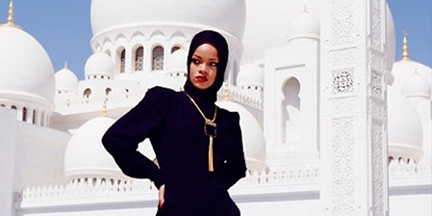
Image: Rihanna’s Instagram
by Fatimah Jackson-Best, Aquila Style, October 28, 2013
International pop icon Rihanna recently made the news after being asked to leave the Sheikh Zayed Grand Mosque in Abu Dhabi. According to a statement issued by the mosque, the singer’s removal from the grounds was based on several reasons, which include attempting to enter the mosque through a gate that was not allowed for visitors, failing to get the proper permission to visit and tour the mosque, and failing to behave in a way that was in accordance with the sanctity of the mosque.[i] Instagram photos of the singer posing in front of the mosque also sparked reactions from Muslims and non-Muslims around the world.
I learnt that she had been barred from entering the mosque on my Facebook wall, from a friend who jokingly reminded me that I could relate to the story, because I had also been prevented from visiting a mosque here in Barbados – twice.
The more recent incident was when I approached a local mosque for a photograph of the property to accompany an article I was writing on the differences between spending Ramadan in Toronto and Barbados. I was told by a male mosque administrator that I could take pictures, but that I couldn’t come in – a restriction that was particularly painful since it was the first day of Ramadan, one of the most sacred months in the Islamic calendar.
Years before, while on vacation, I was told by a husband and wife living near the premises of this same mosque that I could not enter because there was no place for women to pray. Both times I left feeling angry and sad, wondering who had the power to decide who was allowed in the mosque, and whether they realised how damaging their decisions were.
Why is exclusion from mosques an issue that keeps coming up in Muslim communities all over the world?
When this situation with Rihanna came to my attention, I found myself thinking again about the bigger picture. Beyond moralistic explanations of who she is, what she does, and what she wears, I wondered if it is right for anyone to be excluded from a space which is supposed to foster spirituality. I also wondered: why is exclusion from mosques an issue that keeps coming up in Muslim communities all over the world?
What I realised is that women, non-Muslims, people on the margins of Islam (people that may identify as Muslim but do not participate in Islam, or non-practising Muslims) and even people with disabilities are systematically excluded from the mosque’s space – whether intentionally or through ignorance. This is evident when wheelchair ramps and elevators are not installed in our mosques, when mosques do not participate in community outreach to invite Muslims and non-Muslims into their environment, and when women are prevented from attending prayers (whether based on cultural ideas or a lack of adequate spaces).
This is a major issue in our communities, which doesn’t start or end with this story about Rihanna. In fact, by focusing on her clothing and poses as a measure of whether she deserved to be kicked out or not, we avoid talking about the very real issues we have as an ummah, as a truly global Muslim community.
If a non-Muslim isn’t converting to Islam, many mosques find it unnecessary to engage with them through informational events, multifaith activities, or simply opening their doors. If a woman isn’t presenting herself in a certain way, she may not be prevented from entering the mosque, but other women may not speak to her or welcome her. I have seen both these things happen, and it is a symptom of a bigger issue: our mosques are not being used to fulfil their purpose of being spaces for thought, discussion, spirituality, and fostering a sense of community.
The community I speak of does not only include Muslims but also people who wish to be allies of Islam. We need both to enhance Islam’s positive impact on the world and to continue to show the true beauty of the religion in the face of gross misrepresentation and misunderstanding. If we fail to include Muslim women, Muslims with disabilities, non-Muslims and Muslims on the margins, how will the message of Islam’s peace and oneness be spread? If we are only preaching to each other in the end, is that success and is that something to be proud of?
So the issue for me isn’t whether Rihanna’s poses were too “racy†or whether her lipstick was too red, but that many mosques have become places where laws of culture override the essence of Islam. The desire to dominate with religious ideology has overtaken the goal of transforming societies and individuals. To me, this is what we should be truly concerned about.